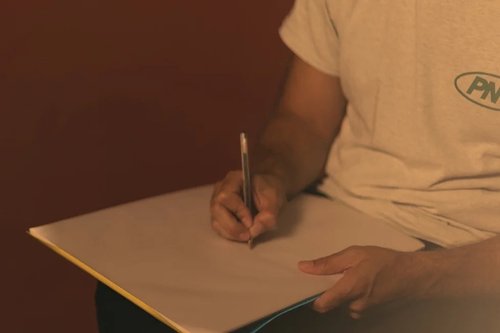Strategic responses: Mastering situational questions in job interviews
Jan 09, 2024
5 mins


US Editor at Welcome to the Jungle
Situational interview questions, those “Tell me about a time when…” moments, are crucial in revealing a candidate’s problem-solving and critical-thinking skills. They seem simple but can really make you sweat. Imagine this: you’re perched in the hot seat, and the interviewer throws a curveball, “How did you handle a recent high-pressure situation?” Suddenly, it’s not just about flaunting your skills or patting yourself on the back for your technical knowledge or impressive certifications list. It’s about diving deep into your experiences and pulling out those moments that showcase your soft skills.
HR expert, podcast host, fractional CPO at CPO PLAYBOOK consultancy, and advisory board member for Y-Combinator company Paragon One, Felicia Shakiba explains that “situational interview questions help us understand how candidates use their skills and knowledge in real-world situations. We get to see their problem-solving abilities, decision-making skills, and behavioral tendencies.” Having interviewed a multitude of candidates, she is well-versed in these interview questions and understands what makes a successful response. Let’s dive in.
What’s the goal of situational interview questions?
These questions are more than just a review of past actions; they offer insights into a candidate’s potential future performance. Shakiba explains that recruiters are searching for indicators like adaptability, emotional intelligence, and the capacity to learn from past mistakes to predict future job success. This narrative element of the interview process allows candidates to showcase how their experiences have honed their professional skills. So, they’re kind of important.
Types of situational questions to expect in your next interview
1. Problem-solving and decision-making
Example: “Tell me about a time when you faced an unexpected challenge at work. How did you handle it?”
Purpose: This type of question assesses your ability to identify problems, analyze situations, and make informed decisions. Shakiba says she looks for how candidates have historically tackled challenges and their approach to resolution.
2. Teamwork and collaboration
Example 1: “Describe a situation where you had to work closely with a difficult colleague. How did you manage the relationship and the project?”
Example 2: “Share an experience where your contribution to a team project made a significant difference.”
Purpose: Here, the focus is on your ability to work effectively with others. They look into your teamwork skills, focusing on collaboration, effective communication, and your role in driving team success. Shakiba says to look for examples demonstrating how you work with others, especially in challenging dynamics.
3. Adaptability
Example: “How would you adapt to a sudden change in project direction after investing significant time in the original plan?”
Purpose: Adaptability questions test your ability to adjust to changes and think on your feet. Shakiba points out the need to illustrate flexibility and resilience in your response.
4. Conflict resolution
Example: “Tell me about a time when you had a disagreement with your manager. How was the conflict resolved?”
Purpose: Conflict resolution questions evaluate your interpersonal skills and how you handle disagreements. Shakiba seeks clarity in such scenarios, asking, “How did you deal with it? How did you emerge from that scenario? Did you manage to resolve it on good terms?”
5. A time when you failed
Example: “Describe a situation when you failed at a task and how you handled it.”
Purpose: This question assesses your ability to handle and learn from failure. Shakiba says she looks to see if the candidate can take their learnings from past failures. It’s about showcasing resilience and the ability to turn setbacks into growth opportunities.
6. Overcoming a challenge
Example: “Tell me about a time when you overcame a significant challenge in the workplace.”
Purpose: This question seeks to understand how you approach and solve problems under pressure. Shakiba says she looks for how you apply critical thinking and resourcefulness in challenging scenarios. She also notes that overcoming challenges is not just about the result but also the process and approach. She’s keen to see how candidates adapt and evolve in the face of challenges.
How to respond to situational interview questions
STAR Method to the rescue!
There’s really only one way to structure your answers: the STAR method. A cornerstone technique, this method is an acronym for Situation, Task, Action, Result, explains Shakiba. It provides a narrative framework allowing candidates to present their experiences coherently.
- ‘Situation’ sets the scene, providing a relevant and relatable context.
- ‘Task’ follows, outlining the challenge or responsibility at hand, demanding specificity to clarify the candidate’s role.
- ‘Action’ is the heart of the response, where candidates delve into the steps they took, showcasing their approach, skills, and decision-making processes.
- ‘Result’ wraps up the story, spotlighting the outcomes of their actions, highlighting successes, learnings, or both.
The most important letter in the STAR Method? R for results, explains Shakiba. “I’m looking for what they accomplished,” she adds, emphasizing the need for candidates to explain outcomes and analyze the effectiveness of their actions. “Knowing your numbers if you need to know them,” she says, highlighting the value of quantifying results.
Failed at a goal? Even better
Show self-awareness by discussing what you learned from the experience, especially when outcomes didn’t align with initial expectations, explains Shakiba. When interviewing, she looks for what the candidate has learned from unaccomplished goals. When crafting your response, focus on conveying how past lessons have shaped your approach to future challenges.
Take the company’s culture and values into consideration
Ever wonder why your well-crafted, STAR-approved answer doesn’t always spark enthusiasm in your interviewer? Well, your answer might not be wrong, but rather the wrong fit for the company. “Consider a highly regulated sector like biotech or finance,” Shakiba suggests, “where adherence to strict rules is key. I look to see if the candidate can thrive in such a structured environment.” Conversely, she points out, “In a startup setting, the question becomes: Is the candidate flexible and bold enough to quickly adapt and take on varied roles?”
So, how do you add culture and value to your responses? Look online! “A good starting point is the company’s career website, where most companies list their values,” she says. For a deeper dive, explore their entire online presence: “Reading stories on Glassdoor and understanding the company’s leadership through LinkedIn can give you insights into how actively the company embodies its stated values.”
Common mistakes to avoid
1. Don’t be surface-level with your answers
Have depth to your responses, particularly when recounting past experiences. Surface-level answers, such as trivial disagreements over holiday party themes, are less compelling than those demonstrating substantial professional challenges, like significant conflicts with a manager over work expectations. Shakiba encourages candidates to delve deeper, sharing experiences that align closely with the situation posed in the question. The key, according to Shakiba, is to showcase whether a candidate has genuinely navigated complex, real-world issues rather than merely skimming the surface.
2. Don’t make up a story, she can tell
Lying is rarely the answer, so fabricating stories in interviews isn’t ideal either. Shakiba notes, “It’s fairly easy to figure out when someone is making up a story; they get really nervous.” Instead of concocting tales, Shakiba advises candidates to prepare real stories in advance. She suggests an honest approach: “Hey, I don’t have exact experience in that situation. But here’s a relatable situation I can tell you about.” This method, she believes, is far more valuable than attempting to craft a narrative about an unexperienced event.
3. Don’t bring up only hard skills
Shakiba cautions against overly focusing on hard skills in responses, noting a tendency for candidates to react hastily to keywords: “Sometimes people … think of a word and go, ‘Oh, they talked about engineering, so I should talk about engineering.’” However, she clarifies, “We’re not looking specifically for the hard skills in this type of question … we’re looking for the soft skills.” Her advice is to steer clear of going too deep into technical details and instead focus on demonstrating softer skills like teamwork and emotional intelligence.
Not so tricky anymore
Those tricky “Tell me about a time when …” questions do more than just scratch the surface—they’re your ticket to showcasing how you think on your feet, adapt, and collaborate. Remember, it’s not just about what you did but how you did it and what you learned. Nail your responses with the STAR method, focus on real-life results, and align them with the company’s culture and values. Steer clear of fabrications and keep it real. Ultimately, mastering these questions is your chance to demonstrate to recruiters that you’re fully equipped and eager to tackle the challenges that lie ahead.
Photo: Welcome to the Jungle
Follow Welcome to the Jungle on Facebook, LinkedIn, and Instagram, and subscribe to our newsletter to get our latest articles every week!

More inspiration: Prepare for a job interview

Hybrid work goals: How to nail the negotiation in your next job interview
Want a hybrid work setup? Learn how to research, negotiate, and showcase the benefits of flexibility during your next job interview.
Dec 19, 2024

The secret to interview success? That annoying colleague
Got a story about a difficult coworker? Good! That office drama might just be your ticket to acing your next interview.
Dec 16, 2024

Is flexibility the key to “having it all” as a parent?
Balancing a career and parenthood can be challenging, but with the right approach, it’s possible to achieve both.
Oct 08, 2024

Slacker vs. control freak: What’s your interview style?
We’ve all been there: whether you're overly anxious or effortlessly cool—what best describes you?
Sep 24, 2024

Overcoming neurotypical norms during the job hunt
Neurodiverse individuals bring valuable innovation and should be more included in the workplace. How can we embrace their unique talents?
Sep 23, 2024
The newsletter that does the job
Want to keep up with the latest articles? Twice a week you can receive stories, jobs, and tips in your inbox.

Looking for your next job?
Over 200,000 people have found a job with Welcome to the Jungle.
Explore jobs